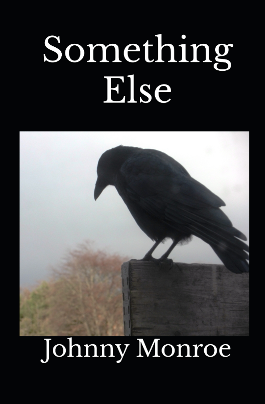
Verse
Selections from a poetic collection
Samples selected from the following Johnny Monroe volumes
Oak Apple Day (2020)
Year Zero (2020)
Magpie (2019)
Beautiful Ghost (2019)
‘I have been privileged to have found Johnny Monroe’s books of poetry. He is a prolific author of novels, but his poetry reduces me to laughter and tears as he explores love and loss, and the beauty, pain and fragility of our lives with unerring strokes.
To quote psychologist Rollo May (1909-1994), “He writes like an angel about the demons who beset us all”.’
Catherine Squire-Walsh
I will always defend poetry, though it can sometimes be an uphill struggle. Say the word ‘poetry’ to some and (once eyes have rolled) we’re haunted by the ghost of Rik Mayall as his People’s Poet character on the ‘Wogan’ TV show in the 80s; this satricial and not-inaccurate portrayal of the poet-as-performer lingers in certain sections of the popular imagination when it comes to verse. Rik’s one-line masterpiece, ‘THATCHER!’, may have personified a solitary strain of the genre to some, but his sharply-observed piss-take can no more be held-up as an archetypal emodiment of the poet than Def Leppard can be said to represent all Rock Music.
Poetry has a raw deal as a literary subculture, yet it retains a unique ability to touch a nerve if given the chance. It is the poor relation of a publishing industry too geared towards prestigious literary prizes on one hand and ghost-written celeb memoirs on the other to remember it was poetry that helped put it on the map 200 years ago; the print medium gave us the first wordsmiths to impact beyond the stage, connecting with a barely-literate populace nonetheless capable of reciting folk ballads that had been handed down orally - a populace therefore amenable to the poem in all its myriad guises. Before the novel overtook it in the middle of the 19th century, poetry was where it was at.
After being usurped by prose as the dominant literary form during the Victorian era, poetry made a similar journey to Jazz after the arrival of Rock ‘n’ Roll, continuing to flourish and innovate, but doing so with a much more select readership. Yet it remained a gateway to reading for the very young. Any child fortunate enough to be exposed to the magic of rhyme via the limerick and a master practitioner like Spike Milligan learns early on how effective verse can be in expressing a point in as few words as possible.
John Lennon’s two volumes of Lear-esque nonsense verse in the mid-60s underlined the connection between poetry and the new literate generation of pop stars. As an artist who always regarded himself as a poet rather than a pop star, Jim Morrison once observed that nobody can memorise and recite an entire novel in the way they can a poem or song lyric, and he recognised musicians from Dylan onwards were the true inheritors of a genre capable of impacting upon a mass audience.
Like Jim Morrison himself, Byron, Shelley and Keats all died young (Byron the eldest at just 36) and cemented the long-lasting image of the poet as doomed, tortured genius. They remain the blueprint for poetry’s appeal during adolescence, and their enduring shadows fell upon me in my teenage years, as they did numerous others.
Like many attracted by the ‘Rock Star’ qualities of the Romantics, I embraced their oeuvre. From adolescence up to the end of my 20s, I spent nigh-on two decades writing verse that was intended to be put to music to facilitate my Byronic intentions, though it rarely was. Eventually, I exhausted the form and myself, re-connecting with prose as an alternative option (one which had been the prime written medium of my childhood). I didn’t go near verse again until a personal tragedy unexpectedly reunited me with it, something that made me realise verse was a far more effective and immediate means of articulating specific emotions than spending six months slogging away on a novel.
In terms of influence, the generation of post-war poets whose reputations have courted as much controversy as lingering awe in recent decades subconsciously shaped my approach above all others, and verse to me now is interchangeable with prose. Anyone for whom ‘poetry’ remains a rude word should belatedly jettison their prejudices and see verse for what it is - an eternally versatile and flexible form of self-expression that can make the reader realise they’re not alone better than any other.
‘Unfinished Fantasies’, a new poetry collection from Johnny Monroe, published 8 August 2021.
‘Something Else’, the ninth poetry collection by Johnny Monroe, published 4 February 2025.
‘Almanac’, yet another new poetry collection from Johnny Monroe, published 28 March 2023.
‘All I’ve done is reveal human traits…at the point they see themselves in it, the communication is complete’ - Joni Mitchell












